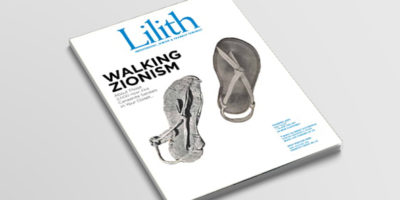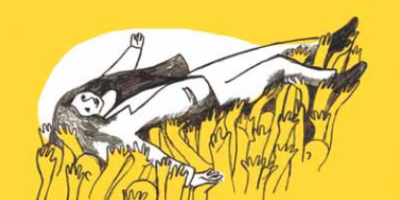Making Art Where Religion and Rejection Intersect
Three women artists who left the religious worlds of their upbringing yet who were nonetheless able to wind back to a Judaism of comfort and inspiration spoke last winter about “Spiritual Journeys of Jewish Women Artists.”
Musician Basya Schechter, visual artist Helène Aylon and writer Susan Reimer-Torn told their stories at Manhattan’s Congregation B’nai Jeshurun, on a panel moderated by Sandee Brawarsky, culture editor of New York’s Jewish Week newspaper.
The three panelists’ choice of headwear spoke volumes.
Schechter, musical director of the Jewish Renewal community Romemu and founder and leader of the Jewish-American world music band Pharaoh’s Daughter, wore a slouchy, hippie-style hat with buttons running down its side. Aylon, a visual, conceptual, and installation artist whose art relates to Jewish biblical texts, wore a conservative black “Shabbos hat.” And Reimer-Torn, writer and memoirist with (in her own words) “an anti-authoritarian streak,” didn’t need to accessorize at all; she was sporting a sophisticated mohawk haircut.
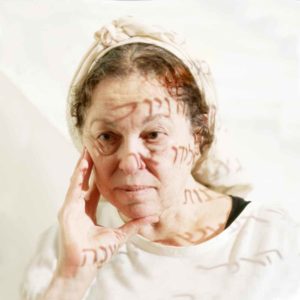
“Helène Aylon: Self Portrait” 2005, from the series “Self Portraits” 2005-2007
Helène Aylon, 84, married an Orthodox rabbi straight out of high school, had two children, and was widowed by 30. It was after her husband’s death, as an art major at Brooklyn College, that she found herself as an artist, a feminist, and a Jew. As she writes in her memoir Whatever is Contained Must be Released: My Jewish Orthodox Girlhood, My Life as a Feminist Artist, “My degree in art would be a degree in freedom.”
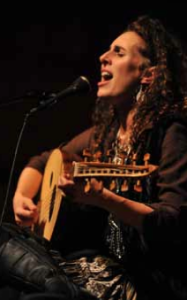
Basya Schecter
Basya Schechter’s break with the Orthodox world was more abrupt. As a young girl of six or seven “with an obsessive-compulsive streak,” she remembers thinking that if she continued to follow halakha, or Jewish law, so stringently, she was “going to literally go crazy.” After high school, she enrolled in a yeshiva in Israel in an attempt to “get on the right path.” But she was expelled for hitchhiking, marking the real break between her old life and her new one. Her band’s latest album, Dumiyah, beautifully reinterprets prayers and liturgical poetry.
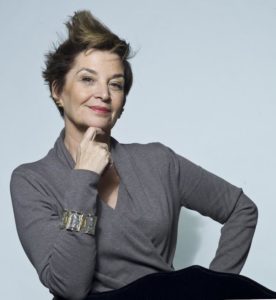
Susan Reimer-Torn. Photo by Joan Roth.
Susan Reimer-Torn felt that as a female she couldn’t “claim authority” in the Orthodox world in which she grew up. As a teenager drawn to dance, she yearned to “take possession of [her] body as a dancer.” To do this, and to escape the restrictions imposed upon her by her family’s brand of Judaism, she left New York for Paris, where she remained for over 20 years, living a completely secular life until her return to New York in 2001. Her memoir, Maybe Not Such a Good Girl: Reflections on Rupture & Return, was published in June 2014.
What emerged from these tales of repression, pain, departure, healing, self-expression, return, and (occasional) reconciliation was an exploration of the relationship between religion and art. As Sandee Brawarsky astutely pointed out, these three women artists do not take on the familiar “Asher Lev persona”— the character in the eponymous Chaim Potok novel who uses art as a means to reject religion. On the contrary, for these female artists, their Jewishness is intrinsic to their art.
Reimer-Torn talked about how the ritual, color, folklore, and transcendence involved in an Orthodox upbringing fed her creativity. Schechter described how as an Orthodox child as well as in her present-day life as a musician, she has felt that she is “channeling,” or acting as a vessel for something (like God, or music), rather than creating. Aylon spoke of being inspired by the “amazing piety” of a roommate of hers who washed her hands and recited the Modeh Ani blessing immediately upon waking up, without even leaving her bed. “When I try to explain the Liberation of God [to my mother],” she added, referring to one of her major works, which involved highlighting in pink the misogynistic passages of the Torah, “My mother says, ‘I’m a plain person.’” Surprisingly, Aylon takes comfort in her mother’s lack of interest in her feminist statement. “Do you think I wanted another answer?” Aylon asks about her mother’s response. “I still need the Borough Park,” she explains, referring to the ultra-Orthodox Brooklyn neighborhood. “I still need it, no matter what.”

